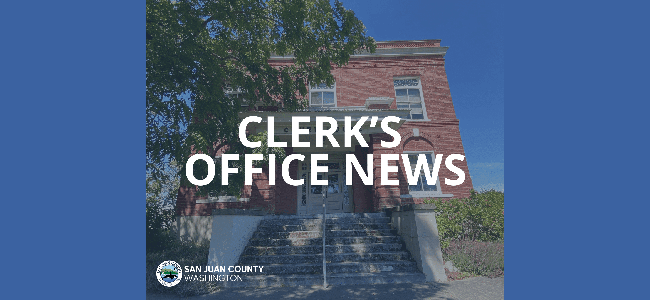— by Tom Evans —
Want to get rich in the San Juans? Easy. Buy house. Buy vacation rental permit (cheap). Rent house.
My neighbor, a very savvy business person, is pushing for two side-by-side rentals with 18 renters. Daily. Income: $1,750. Full season total income: $157,500. Tax-free after depreciation. Every single homeowner in the San Juan’s is at risk for vacation rental(s) next door.
And you can’t stop them. Why? SJC has bypassed every single environmental law to make this possible. Impossible? Not when your County code states there is no difference between 1 person occupying a house full time and 9 week-by-week vacationers.
I oppose unlimited, uncontrolled vacation rentals on behalf of Box Bay Shellfish farm, a nonprofit oyster grower which grows oysters for water cleansing purposes only. Each oyster filters 50 gallons of salt water per hour. There are 20,000 of them. Excess oysters are given free for charitable events, neighbors, and elementary school teaching about how an oyster
grows and an oyster farm works.
My neighbor claims to have already spent $120,000 in legal fees. I believe him. We are not even past the hearing examiner stage. This is likely to take 5 years or more. The first lawsuit is being filed today.
On August 15, 2018 DCD testified, under oath:
(1) rentals have no environmental impacts
(2) “we don’t see vacation rentals as being any different than residential development”
(3) no difference between 300 residences and and 300 rentals
(4) no cumulative rental impacts
(5) no limit on number of rentals allowed
(6) noise/traffic no different than unrented house
(7) no idea how many vacation rentals there are
(8) never have studied impacts of vacation rentals, no plans to ever do so (9) no idea how many illegal rentals there are
(10) never consult with other agencies because there are no impacts
(11) enforcement squarely in hands of real estate industry.
Recent DCD PR proclaims now they know the number of vacation rentals, are looking for illegals, have super-new permit holder guidelines. What they wont say, the “new” guidelines are simply new orders to the fox (real estate) guarding the henhouse, new guidelines only apply to recent permits, nothing has changed about studying impacts, requiring permits, living with the fantasy there never will be one too many rental permits.
**If you are reading theOrcasonian for free, thank your fellow islanders. If you would like to support theOrcasonian CLICK HERE to set your modestly-priced, voluntary subscription. Otherwise, no worries; we’re happy to share with you.**








I like the idea of getting rich easily…Please provide more details. How much will it cost me to buy an 18 unit rental unit like you describe and where do I find these? What are the taxes, mortgage costs, insurance costs, maintenance and utility costs for all of this? Most of the realtors I spoke to take at least 50% of rental income as a management fee; do you have an alternative to offer?
What is DCD?
To Molly: Department of Community Development. I believe.
It is time for a closer look at vacation rentals and the social impacts.
The vacation rental concept presents a real-life moral dilemma:
So handy when we’re the traveler; so potentially obnoxious when we’re the neighbor; such a brilliant moneymaker when we have unused space. Off hand I can’t think of a more “text-book” case!
I really don’t know where I come down at this point . . . beyond a reflexive nimby response.
The key question for me when the NIMBY (Not In My Backyard) issue is raised is, Just what does one consider to be his/her back yard? Is not the entire island our collective “back yard”? The map showing locations for existing vacation rentals which accompanies Mr. Evans’ lawsuit is a real eyeopener…how can we believe that there are no adverse environmental or societal impacts when single family residences, hitherto seasonally vacant or available as long-term rentals to meet our collective need for affordable housing are suddenly available as weekend party houses?
Air B & B is a truly disruptive technology…time for a serious conversation about it and its impacts on island life.
We do need to examine the environmental impact of airbnb and other rentals. However, my hope is that we also do not lump all vacation rentals together. There are quite a few residents, not vacationers, on our island, who live here full time and use their guest houses or rooms to occasionally earn money so that they can afford to live here, to pay their mortgages, to donate to our non-profits or to fund their artistic endeavors. And this does not detract from affordable full-time housing. These residents would never be comfortable renting their rooms or guesthouses full-time anyway. For me personally, I’ve rented our guest suite under our house before to earn income so that I can take time off of other work to give back to the festivals and teen programs that I have co-founded or help run for our community.
Ayn, balanced and thoughtful. I like it-personalized and individually tailored. So how does Orcas select a housing Czar to make these decisions?
It is one thing to live full-time on a property while temporarily renting out part of it during tourist season, and quite another to own a vacation-rental-only house which sits vacant for nine months of the year.
While it might be an unconstitutional “taking” to require that homes which sit unused for more than, say, four months be somehow rearranged to permit the permanent year-’round housing of a caretaker family, thereby giving affordable housing to an island worker, such a scheme would nevertheless provide tremendous social benefits.
So perhaps a thoughtful county legislator could come up with a scheme to make this a possibility without offending the Constitution.
The ordinance might be written from the point of view of heading-off vandalism and other crimes against property. This, I believe, would go far toward eliminating the constitutionally offensive “illegal taking” aspect.
My personal belief is that vacation-rental properties which sit idle for most of the year are an affront to both society and morality.
A few comments on Mr. Henigson’s proposal. First, he acknowledges that it would be an unconstitutional “taking” that would never be allowed by the courts–nor should it. The notion of the government arriving to tell you to shelter anyone in your property–short of a real emergency–is beyond disturbing. Second, few vacation rentals sit empty for many months in a stretch; they generally are open to rental year-round. (Like most things, we have little data collected on such questions.) Third, it would not cure the problem of the designated family having to move out for at least four months to another lodging. Fourth, who picks the people who get to live in the higher-end properties as “caretakers,” what do they pay in rent, and who insures the homeowner from damage to his or her property from the renters? Finally, how is this different from people who own second homes here and use them only in the summer and other holidays?
All it takes is a glance at the history of Soviet Russia to know how well government-administered plans like this work out. It seems to me that a better approach would be for employees to be paid a decent wage and for the Comp Plan to encourage a diversity of rental options. Both those approaches are clearly constitutional.
P.S. I do not own, and have never owned, a vacation rental.